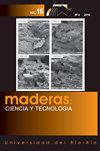棕榈废弃物的化学成分缓慢热解衍生的醋
IF 1.5
4区 农林科学
Q3 MATERIALS SCIENCE, PAPER & WOOD
引用次数: 0
摘要
在潮湿和干燥地区的沟槽中,随机收集棕榈树的轴和茎,并切碎进行缓慢热解过程。用气相色谱仪在水相中鉴定了一套热解衍生醋的化学成分,并在采样的树木和沟槽中进行了定量比较。另一组食醋用二氯甲烷脱水,用气相色谱仪联用质谱仪对其成分进行鉴定,两种取样槽的水相化学成分相同,但百分比值不同。在有机相中,定量比较了样品零件和凹槽的共同化学成分。在湿润地区,茎干的乙酸含量是湿区茎干的2.22倍,苯酚含量是湿区茎干的2.37倍,而湿区茎干的乙酸含量则是湿区茎干的15.35%。取样区茎和轴的有机相主要化学成分为糠醛、苯酚、苯甲酸、5-甲基-2-糠醛、丁酸和2-甲基苯酚。来自干旱地区的茎中这些化学物质的含量要高36%到55%;96年,93%;6、37次,62、05次;49个;32%, 57%。湿润地区的茎轴中含有较多的糠醛,分别为63,95%,22,08%和2-甲基苯酚,而干燥地区的茎轴中苯甲酸的酚含量分别为46,20%和2,5倍。两个阶段的结果表明,对同一物种棕榈的化学成分的生态影响是明显的。本文章由计算机程序翻译,如有差异,请以英文原文为准。
Chemical constituents of palm wastes slow pyrolysis derived vinegar
Out of rachis and stem of palm tree from grooves in humid and dry zones, test materials were randomly collected and chipped for slow pyrolysis process. Chemical constituents of a set of pyrolysis derived vinegar were identified in their aqueous phase by gas chromatograph and quantitatively compared in sampled parts of sampled tree and grooves. Another set of vinegar was dewatered by dichloromethane, then their constituents were identified by gas chromatograph coupled with mass spectrometer, chemical constituents in aqueous state in both sampled grooves were the same but with different percentage values. In the organic phase, common chemical constituents of sampled parts and grooves were quantitatively compared. In humid zone rachis was 2,22 times richer in acetic acid and 2,37 times in phenol, but in dry zone stem is richer in acetic acid by 15,35 %. In their organic phases dominant and comparable chemicals of stem and rachis from sampled zone were furfural, phenol, benzic acid, 5-methyl-2- furancarboraldehyde, butanic acid and 2-methyl-phenol. Stem from dry zone was richer in these chemicals by 36,55 %; 96,93 %; 6,37 times, 62,05; 49; 32,57 % respectively. Rachis of humid zone contained more furfural, 63,95 %, 22,08 %, 2-methyl-phenol, but that of dry zone was richer in phenol by 46,20 %, 2,5 times in benzoic acid. Results from both phases of vinegar indicate that ecological impacts on the chemical constituents of palm from the same species are evident.
求助全文
通过发布文献求助,成功后即可免费获取论文全文。
去求助
来源期刊

Maderas-ciencia Y Tecnologia
工程技术-材料科学:纸与木材
CiteScore
2.60
自引率
13.30%
发文量
33
审稿时长
>12 weeks
期刊介绍:
Maderas-Cienc Tecnol publishes inedits and original research articles in Spanish and English. The contributions for their publication should be unpublished and the journal is reserved all the rights of reproduction of the content of the same ones. All the articles are subjected to evaluation to the Publishing Committee or external consultants. At least two reviewers under double blind system. Previous acceptance of the Publishing Committee, summaries of thesis of Magíster and Doctorate are also published, technical opinions, revision of books and reports of congresses, related with the Science and the Technology of the Wood. The journal have not articles processing and submission charges.
 求助内容:
求助内容: 应助结果提醒方式:
应助结果提醒方式:


